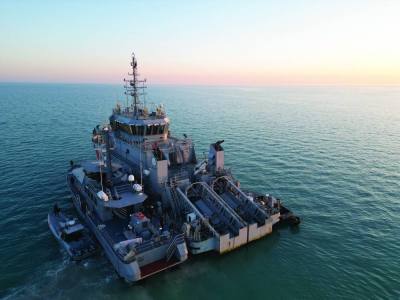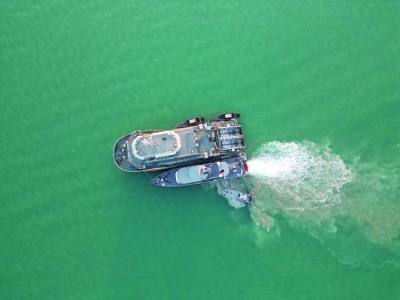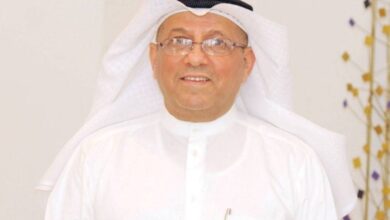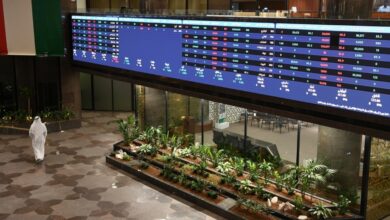Kuwait enhances maritime borders with advanced radar technology
Brigadier General Sheikh Mubarak Al-Yousef, Director of the General Directorate of the Coast Guard, announced a direct contract with a British company to build 12 radar towers, stating, “We’ve embraced AI by upgrading navigational systems to identify incoming ships.”

• Brigadier General Sheikh Mubarak Al-Yousef announced the replacement of Kuwait’s navigational aids with advanced systems that transmit unique frequencies, enabling full monitoring of ships and aircraft within 18 months.
• Al-Yousef stated that automatic identification devices now enable effective monitoring of fishermen and detection of incidents like theft or assault within and beyond Kuwait’s waters.
• Al-Yousef announced a contract with the UAE to upgrade 21 Coast Guard boats to 2025 models within two years and noted strong compliance with 15,000 of 20,000 Jet Ski licenses renewed, while only 3,000 induction devices have been installed, with a three-month grace period granted.
Brigadier General Sheikh Mubarak Al-Yousef, Director of the General Directorate of the Coast Guard, revealed a comprehensive development plan for upgrading equipment, machinery, armament, and communications. He highlighted that the radar system, established in 2005, has not seen any development over the past twenty years, with only maintenance being carried out, as reported by Al Rai newspaper.
Al-Yousef stated in exclusive comments to the newspaper, “The administration was able to sign a direct contract with a British company, without intermediaries or agents, to establish 12 towers for the radar system, in addition to providing naval surveillance aircraft. This step is the first of its kind in the Gulf Cooperation Council countries. Today, we have two aircraft operating around the clock at sea.”

He also pointed out, “We are replacing all navigational aids in Kuwait from north to south, known as ‘Al-Bawiyat.’ All of them will be replaced and completed within 18 months. The new aids will not be like the current ones; they will transmit on a specific frequency and identify themselves by number. Any ship or aircraft entering the country will be monitored through these devices.”
He added, “With this initiative, we have entered the era of artificial intelligence. Even foreign ships entering Kuwaiti territorial waters will notice the qualitative shift in navigational aids, which will help facilitate the identification of all ships entering Kuwait’s waters.”
Protecting the maritime borders
Brigadier Mubarak Al-Yousef also said, “His Highness the Amir Sheikh Meshal Al-Ahmad Al-Jaber Al-Sabah, may God protect him, emphasized security and law enforcement during his visit to the Ministry of Interior last Ramadan. Based on these instructions, we began applying the law, raising awareness, and increasing readiness in the General Directorate of the Coast Guard to protect the maritime borders of Kuwait and control any crimes affecting them or its islands.
Everyone in the coast guard enjoys high morale
He highlighted that “over the past seven months, my colleagues—department directors, both military and civilian — and I have worked as one cohesive team, comparable to a hive of bees. We focused on creating a positive work environment founded on justice, where we proactively addressed initiatives instead of merely reacting to situations. As a result, everyone in the coast guard now enjoys high morale.
In terms of training, we prioritized its management as we observed that many departments had neglected this critical area. Emphasizing training elevates the overall competence of the administration. Our focus on training extends beyond military personnel to include civilians, ensuring everyone benefits from these efforts.”
Effective monitoring of regional waters by radar system
Brigadier General Al-Yousef emphasized: “Despite the absence of maintenance contracts, we purchase and install the required parts ourselves. The dedication of civilian and military personnel in the Coast Guard ensures the radar system effectively covers all regional waters. I am proud of their teamwork. However, our ambition extends far beyond this.

The current radar system, operational since 2005, has served well, but we aim for a much more advanced security infrastructure. Thankfully, the next security system contract has been approved, marking a significant challenge. It has passed all regulatory reviews, the contract is signed, and implementation is underway. In less than a year and a half, it will be fully operational.”
Fishing regulations
Regarding fishing regulations, Brigadier General Al-Yousef explained: “Kuwait has territorial waters where Kuwaiti laws apply, as well as economic waters whose resources belong to the country. Fishermen can apply for permits through the Ministry of Interior’s website. Once approved, they can fish under our protection.
Recently, I met with several fishermen to address their concerns and challenges. However, I must clarify that some fishermen venture beyond Kuwait’s economic waters into those of neighboring countries. In such cases, we cannot provide security as they are outside our jurisdiction. Those who act beyond the authorized limits must take responsibility for their actions.
With the implementation of automatic identification devices for marine vessels, we can now monitor fishermen’s movements more effectively, whether within or outside Kuwait’s economic waters. This technology enables us to identify incidents such as theft or assault, which was not possible in the past.”
Renewal of marine licenses
Brigadier General Al-Yousef also referred to the decision by Sheikh Fahad Al-Yousef, the First Deputy Prime Minister, Minister of Defense, and Minister of Interior, to waive fines for renewing tarrid (Jet Ski) licenses. He stated: “We have seen remarkable compliance, with approximately 15,000 out of 20,000 marine licenses renewed. There is a strong demand for renewal to take advantage of this grace period, which ends at the end of this year.”
Induction device installation
He stated: “Regarding the induction device, there are about sixteen companies licensed by the Telecommunications Authority that meet the conditions for installing the device. However, some individuals have not installed it because the device is not yet available at their respective companies, and securing it takes time.
We are accommodating and understanding of their situation, as it is beyond their control. Therefore, we allow a grace period of three months for them to install the device. So far, only 3,000 devices have been installed out of 20,000.
For those whose licenses have expired, renewal or transfer will not be permitted until they install the device. Ultimately, they will have to comply because once their license expires or they wish to transfer it, they will need to visit us. We, in turn, will not process their requests until the device is installed.”
Four plans for development
Brigadier Mubarak Al-Yousef emphasized: “The Coast Guard Department has developed a comprehensive plan with input from all departments. The plan is structured around four main pillars:
- Raising morale and fostering a sense of national pride.
- Training and preparing future leaders.
- Integrating technology and artificial intelligence.
- Enhancing armament, equipment, and communication systems.
Through these key focus areas, we aim to bring the Coast Guard to an optimal level of performance in terms of training, readiness, and overall management.”
Comprehensive electronic transformation
“Since assuming responsibility for the General Directorate of the Coast Guard, we have worked as one cohesive team, striving tirelessly for the betterment of our beloved country, Kuwait,” said Brigadier Al-Yousef.
“I am proud to say that for several weeks now, there has not been a single paper used within Coast Guard departments. We are now fully operating through digital transformation, utilizing electronic communication, whether within our departments or with other government agencies. This shift, which took six months of dedicated effort, has been successfully achieved, thanks to God and the hard work of our professional team under significant work pressure.”
Upgrading 21 boats over the next two years
Al-Yousef revealed that “a contract has been signed between us and the brotherly government of the United Arab Emirates to develop and rebuild Coast Guard boats. This includes upgrading 21 boats over the next two years. The project involves replacing outdated parts with modern, advanced machinery and equipment, effectively upgrading the boats from the 2002 model to the 2025 model.”
Tightening measures against drug traffickers
Al-Yousef addressed the decline in drug smuggling and criminal activity, stating: “The statistics speak for themselves. Since the beginning of this year, 66 individuals have been apprehended and referred to specialized authorities for attempting to smuggle drugs and psychotropic substances. Compared to previous years, there is a noticeable difference in the level of strictness within our regional waters, preventing those who might attempt such crimes.”
He continued: “Our colleagues in the Drug Control Department have observed a rise in drug prices, which reflects the increased pressure on traffickers. This is thanks to God, as well as the vigilance and dedication of our security forces, who remain steadfast in protecting the homeland from those seeking to harm its security.”













